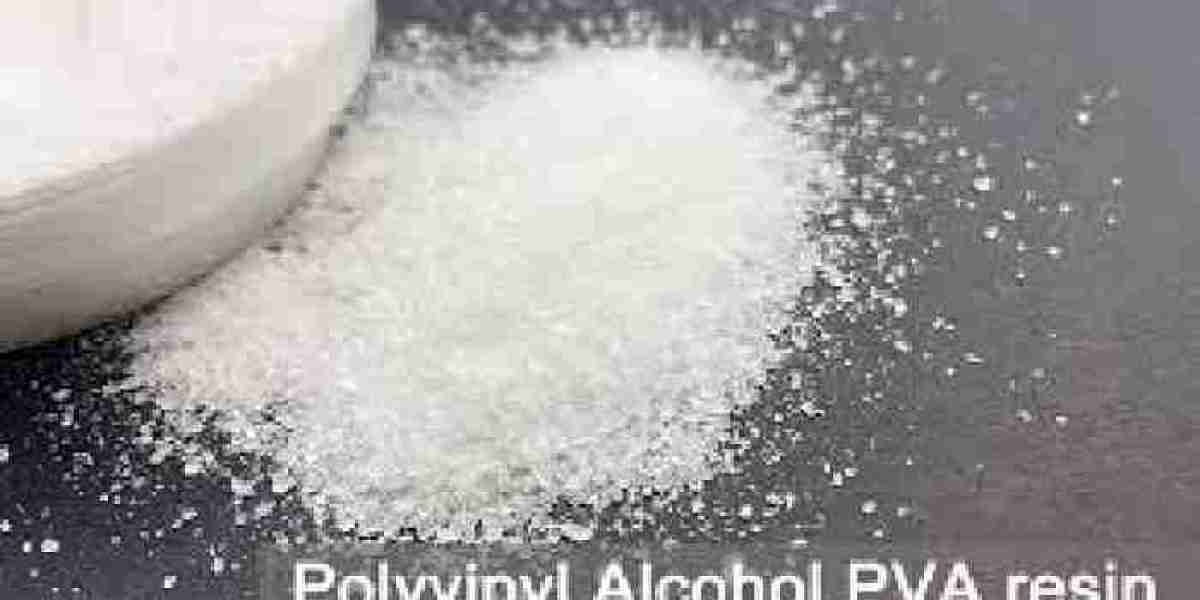Polyvinyl alcohol (PVA) is a water-soluble synthetic polymer that plays a crucial role in various industries, ranging from textiles and paper to pharmaceuticals and environmental applications. Its unique properties, such as water solubility, biodegradability, and film-forming ability, make it an indispensable material for numerous applications. PVA is typically produced through the hydrolysis of polyvinyl acetate (PVAc), where the ester groups are converted into alcohol groups. This process gives PVA its distinctive characteristics and opens the door to a variety of uses.
Synthesis and Properties of Polyvinyl Alcohol
The synthesis of PVA begins with the polymerization of vinyl acetate monomers to form polyvinyl acetate (PVAc). Through a process called hydrolysis, the acetate groups in PVAc are replaced by hydroxyl groups, creating PVA. The degree of hydrolysis and the molecular weight of PVA can be controlled to tailor the polymer’s properties for specific uses. For example, low molecular weight polyvinylalcohol is more soluble in water, while high molecular weight PVA has better mechanical properties.
Polyvinyl alcohol is characterized by several notable properties:
- Water Solubility: One of the most prominent features of PVA is its ability to dissolve in water. This makes it particularly useful in applications that require easy processing or environmental sensitivity.
- Biodegradability: Unlike many synthetic polymers, PVA is biodegradable under specific conditions, making it an environmentally friendly option compared to other plastic materials.
- Film Formation: PVA can form transparent, flexible, and strong films, which is one of its key advantages in packaging and coating applications.
- Chemical Resistance: PVA exhibits resistance to oils, greases, and various chemicals, making it suitable for protective coatings and other industrial applications.
- Non-toxicity: PVA is generally considered non-toxic, which allows for its use in food, pharmaceuticals, and medical devices.
Applications of Polyvinyl Alcohol
- Textiles and Paper Industries In the textile industry, PVA is widely used as a sizing agent for yarns and fabrics. It provides strength and smoothness to fibers, making them easier to weave into fabric. Additionally, PVA is used in the production of nonwoven fabrics, often found in medical supplies like surgical masks and gowns.
In the paper industry, PVA acts as a binder and adhesive for paper coatings and laminations. It enhances the quality and durability of paper products, improving their resistance to water and oil.
- Pharmaceuticals and Healthcare Polyvinyl alcohol plays a significant role in the pharmaceutical industry, particularly in the formulation of drug delivery systems. It is used in the production of capsules and as a binder in tablets. PVA-based hydrogels are also used in wound care, as they can absorb moisture while maintaining a moist environment, promoting healing.
Additionally, PVA is used in contact lens solutions and eye drops due to its ability to provide lubrication and moisture. Its non-toxic nature and compatibility with human tissues make it an ideal material for various healthcare applications.
- Packaging Industry The packaging industry benefits greatly from PVA's film-forming properties. PVA films are often used for biodegradable packaging, especially for single-use products. These films are water-soluble, which means that they can dissolve when exposed to water, leaving behind minimal environmental impact. This makes PVA an attractive option for eco-friendly packaging solutions.
PVA is also used in the creation of "water-soluble films" for packaging applications, such as in laundry detergent pods. These films help contain detergents and other cleaning products, dissolving in water during use without leaving harmful residues.
- Environmental Applications One of the most promising applications of polyvinyl alcohol lies in environmental sustainability. PVA's biodegradability is an essential feature in reducing plastic waste. PVA can break down naturally in the environment, particularly in aquatic settings, without leaving harmful microplastics behind.
Additionally, PVA is being explored for use in water treatment. It is used in flocculation processes to help remove suspended solids from water. PVA-based materials can form gels that trap contaminants, which are then easily removed from the water. This makes PVA a potential candidate for cleaning and purifying wastewater, contributing to environmental protection.
- Cosmetics and Personal Care Polyvinyl alcohol is also employed in the cosmetics and personal care industry. It is used as a film-forming agent in hair styling products, such as gels and mousses. Its ability to form a thin film on the hair allows for the creation of long-lasting styles without stiffness.
PVA is also included in skin care products, including facial masks, due to its ability to form a smooth, flexible layer that adheres to the skin. It can act as a carrier for active ingredients and enhance the texture and feel of cosmetic products.
- Adhesives and Sealants Polyvinyl alcohol is a key ingredient in many adhesive formulations, including those used in bookbinding, labeling, and paper bonding. Its film-forming properties help create a strong and flexible bond, while its water solubility allows for easy cleanup and reapplication.
In sealant applications, PVA is used to provide resistance to water, oil, and other substances, making it suitable for use in construction, automotive, and other industrial applications.
Future Trends and Research in Polyvinyl Alcohol
The demand for more sustainable materials has led to increased interest in polyvinyl alcohol as a potential replacement for traditional plastics. Researchers are focusing on improving its properties, such as enhancing its mechanical strength and making it more resistant to degradation under environmental conditions.
Moreover, there is ongoing research into the use of PVA in biocompatible materials for medical applications, such as tissue engineering and drug delivery systems. Its ability to form hydrogels that mimic human tissues opens up possibilities for PVA to be used in the development of artificial organs or scaffolds for cell growth.
Conclusion
Polyvinyl alcohol is a versatile polymer with a broad range of applications across multiple industries, including textiles, pharmaceuticals, packaging, and environmental sectors. Its unique combination of water solubility, biodegradability, and film-forming properties make it an attractive material for both existing and emerging technologies. As the world shifts toward more sustainable solutions, PVA’s role in eco-friendly packaging and environmental applications will continue to grow.




